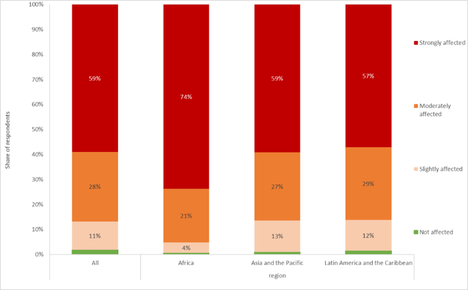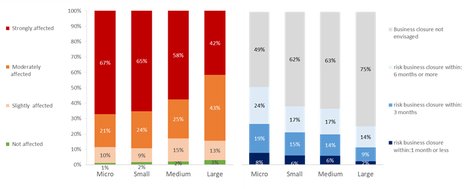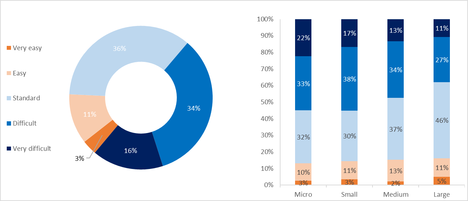
Blog: Quantifying the effect of COVID-19 on small business around the world
While the statistics on the COVID-19 contagion show differences across countries and regions, the deep economic consequences of the health crisis are without question. As a result, micro, small and medium-sized enterprises (MSMEs) are suffering around the world, including in geographic regions not (yet) heavily affected by the virus itself.
On April 20, the International Trade Centre (ITC) launched a unique survey to measure the impact COVID-19 has on small businesses. Here are the results from the first wave of data based on the responses from over 1,200 businesses in 109 countries and collected between 20 April and 4 May¹.
The crisis is affecting companies across all regions
The pandemic has strongly affected the vast majority (60%) of the businesses interviewed. While small businesses feel the effect across all regions, African businesses seem to be hit the most: three out of four interviewed companies perceive severe consequences.
Measures to contain the virus, such as lockdowns and quarantines, have had devastating repercussions for business operations and disrupted many existing local and international value chains. Surveyed business managers report their sales having significantly decreased and that accessing inputs has become increasingly difficult. In other words, companies face difficulties both on the demand and on the supply side.
COVID-19 affects business operations worldwide
Note: Respondents were asked 'How have your business operations been affected by the coronavirus (COVID-19) pandemic?' and 'Which country is your company based in?' Data on 1201 businesses in 109 countries. Only regions with more than 150 observations are included in the graph.
Source: ITC calculations based on ITC Covid-19 Business Impact Survey. Data collected from 21-04-2020 to 04-05-2020.
Small business faces higher risk of permanent closure
Although most firms have been affected by the crisis, the depth and nature of its impact differ by firm size. Survey findings show that two-thirds of micro firms are strongly affected by the crisis, compared with 42% for large companies. The effect on micro, small and medium-sized enterprises is especially severe, partly because they are overrepresented in sectors most strongly hit by the crisis, such as accommodation and food services, or wholesale and retail services².
Indeed, small businesses are particularly vulnerable: they tend to have fewer assets and limited cash reserves to cushion the lockdown-induced liquidity shortages. Survey findings confirm the extent of this vulnerability, with around one out of four micro, small and medium-sized enterprises at risk to shut down permanently within the next three months. This highlights the need for governments to act fast.
Smaller firms are at higher risk of permanently shutting down within a matter of months
Note: Respondents were asked 'How have your business operations been affected by the coronavirus (COVID-19) pandemic?', 'Do you think there is a risk that your business will permanently shut down because of this crisis, and if so, when could this closure occur?' and 'How many full-time employees does the business have?' Data on 1201 businesses in 109 countries.
Source: ITC calculations based on ITC Covid-19 Business Impact Survey. Data collected from 21-04-2020 to 04-05-2020.
Access to information is key to reach out to those most in need
For companies to benefit from assistance programmes put in place by governments, transparency and access to information are key. It is therefore troublesome that half of the survey respondents found it difficult or very difficult to access information and benefits from government assistance programmes relating to COVID-19.
Moreover, even with small enterprises needing support the most, they are often the least likely to benefit from these stimulus packages: our results confirm that smaller firms find it harder to obtain information and benefits. Governments, once COVID-related assistance programmes are put in place, need to ensure swift access to such programmes with transparent procedures.
Accessing information on government assistance programmes is a challenge
Note: Respondents were asked 'How easy is it to access information and benefits from government COVID-related SME assistance programmes?' and 'How many full-time employees does the business have?' Data on 1195 businesses in 109 countries.
Source: ITC calculations based on ITC Covid-19 Business Impact Survey. Data collected from 21-04-2020 to 04-05-2020.
Globally, small businesses make up more than 95% of all firms, accounting for approximately 50% of value added and 65% of total employment, when both formal and informal businesses are taken into account³. A widespread collapse of micro, small and medium-sized enterprises could have a dire impact on national economies and global growth prospects.
In their response to the COVID-19 pandemic, governments should prioritize policies that support small businesses. The International Trade Centre stands ready to support these efforts - and its COVID-19 Business Impact Survey is one of such efforts: we count on the current and upcoming results collected under this survey to inform the relevant assistance from national governments and international funders.
¹ ITC will publish further results and updates of the next waves, including data from partnering local and international business support institutions. Partners include: Conférence permanente des chambres consulaires africaines et francophones (CPCCAF), Chamber of Commerce and Industry of Benin, Ministry of Industry and Handicraft, Chamber of Commerce and Industry of Togo, Department of Trade and Industry Philippines, Kenya National Chamber of Commerce and Industry (KNCCI).









